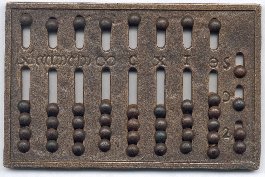
Courtesy Museo Nazionale Ramono
It doesn’t feel like the recession is over.
The Business Cycle Dating Committee of the NBER announced on September 20, 2010 that the recession officially ended in June 2009. The Committee looked at a number of indicators. This is the list from their press release and in parentheses the trough date for each:
- Macroeconomic Advisers’ monthly GDP (June)
- The Stock-Watson index of monthly GDP (June)
- Their index of monthly Gross Domestic Income (July)
- An average of their two indexes of monthly GDP and GDI (June)
- Real manufacturing and trade sales (June)
- Index of Industrial Production (June)
- Real personal income less transfers (October)
- Aggregate hours of work in the total economy (October)
- Payroll survey employment (December)
- Household survey employment (December)
The website provides the data an graphs of each series. I have some reactions.
Why so quickly?
It took the NBER Committee 16 months to date the end of the business cycle. This seems like a long time. However, it isn’t — at least compared to the past two cycles.
In the 2001 recession, it took the Committee 24 months to date the end of the recession.
In the 1990-91 recession, it took the Committee 22 months to date the end of the recession.
Both of these recessions were far less complex than the current recession. The 2001 recession is particularly interesting. It is similar to the current episode because of a very slow recovery in jobs.
My read of the data shows suggests that it is a very tough call to say that employment troughed in December. Let’s consider some data. Payroll survey employment was 137.9 million in December 2007 (beginning of the recession). Employment supposedly troughed in December 2009 at 129.6 million (after the official trough, but employment is not a leading indicator). However, today’s employment is only 130.3 million. It is essentially flat.
Employment – or lack there of – is the reason that most people are wondering what is going on. There are 15 million unemployed.
Well, you might say, “the same thing was true” during 2001. No. The situation is way different.
The trough of the 2001 recession was declared to be November 2001 by the Committee on October 21, 2003. Consider the contrast:
- In October 2003, the unemployment rate was 6%. Today’s rate is 9.6%
- In October 2003, the proportion of labor force unemployed for 15 weeks or more was 2.4%. Today, it is 5.5%.
- In October 2003, the all-in unemployment rate was 10.2%. Today it is 16.7% .
So, it is not just the employment is slow to come around. In October 2003, employment was 1.8% below the peak employment of March 2001. Today, employment is 5.5% below peak of December 2007.
How about this one? Today’s payroll employment is 1.7% below the peak of March 2001. Talk about a lost decade!
What about housing?
There is an important indicator that is surprisingly absent from NBER list: Housing.
Indeed, Housing Starts increased by 10% (News released September 21, 2010). Good news?
The following chart shows the dismal housing situation. The number of starts in August 2010 was 598,000 (annualized). Given I am comparing to previous NBER announcements, consider that in October 2003, there were 2 million starts!
The data looks even worse if you scale by population. Let’s scale the starts by the civilian non-institutional population (civilians over 16 and not in institutions). The most recent data suggests only 0.25% of the population will start a house. This compares to an average of 0.78% (from 1976). This compares of 0.89% in October 2003 (when the last recession was declared over).
Does it matter?
The dating of a recession doesn’t really matter. While I would argue that the historically unique unemployment situation and the depression in the housing market should have been taken into account, in the end, it doesn’t really change anything for the 14.8 million that are unemployed and the multiple millions that have given up looking for a job. It would be, however, a mistake to have an attitude that “the recession is over, let’s move on”. It is not clear the recession is over other than in terms of the official designation.
Sign up for my YouTube channel.




Cam– Your points are right on– who cares about dating the (cyclical) recession, when we have much larger structural problems impeding growth– clogged banking system with massive unrecognized losses on commercial mortgages, income/healthcare taxes that incentivize companies to invest/hire abroad, nearly half of households on government subsidies, only half of workers paying federal income tax, nearly every family has a relative out of work. It is no wonder that job prospects are poor (although I hear there are some economic positions available at the White House). Oh, and one of the bright spots, increased savings of households, has been driven by defaults/restructuring of consumer debt– not something that helps engender bank lending. If the US increases sales taxes, it will have followed the Japan 1990s script.